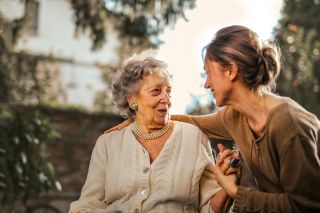Mild Cognitive Impairment
Loving an Aging Parent
Assisting an elderly parent while loving and taking care of yourself.
Posted July 4, 2024 Reviewed by Kaja Perina
Key points
- When an aging parent has declined in functioning, it can be especially difficult for the adult child.
- A support network and self-care are important for the caregiver.
- Setting healthy boundaries and getting help from relatives and friends of the parent is crucial.

Parenting is a difficult job. But what happens when the tables are turned and you feel like you’re parenting your aging mother or father? While we love our parents, feelings of frustration, anger, guilt, and helplessness can creep in for the adult child, especially when the aging parent’s physical or mental functioning has declined.
These feelings combined with processing old emotional baggage and potentially being triggered while interacting with them can result in a perfect storm of emotions. In fact, the adult child (especially the adult daughter) may additionally experience feelings of loss: the reminder of the mortality and eventual loss of the parent, as well as the feeling of loss of their own youth.
Challenges and Fears of the Aging Individual
The aging parent – especially one who has lost their spouse or is divorced – can at times be quite challenging for the adult child or children. In addition to the logistical and medical issues, there may be memory loss and potentially problems with substance abuse in the form of alcohol and/or prescription medications, which can further affect memory and overall functioning.
Elderly individuals may be dealing with (or not dealing with) their own fears – fears of declining health and accidents, bereavement and living alone, loss of independence, crime, and potentially a looming possibility of an assisted living situation. Empathy and respect for what the senior individual is currently experiencing is an important part of the process.
The Adult Child of an Aging Person
However, what about the adult child and close relatives of the aging person? How do they effectively cope with the aging individual? While there are medical devices to alert relatives of emergencies and falls, as well as various levels of assisted living care facilities available when function is substantially reduced, there is much more to the situation than logistical issues. Additionally, the elderly person may be in a certain amount of denial regarding their physical or cognitive decline and be reluctant to use medical alert devices or an assisted living option.
Whether the parent lives with you or you are a thousand miles away, it’s vital that the caregiver has their own support system, be it family and friends, more formal support programs, or both. When the aging parent does not live with the adult child, adult children often carry the emotional burden in a different way including worry, guilt for not being with the parent 24/7, and perhaps a feeling of loss of control over not being able to help the parent as much as they’d like.
Adult children of an aging parent likely have busy and full lives of their own and yet they may feel responsibility (at least partially) for the welfare of the senior parent. While the phrase “It takes a village” refers to raising a child, it’s also an apt saying in the case of a senior citizen with reduced functioning.

Support and Help is Crucial when Caring for an Aging Parent
Enlisting the assistance of relatives and friends of the senior parent is a crucial step in preserving one’s peace of mind and reducing the stress of the situation. One relative alone cannot take on the entire responsibility without going into complete stress overload. In the case of one relative carrying the bulk of the load, if nothing else, there needs to be others to support them through the years. Additional help may be available from the elderly person’s church or place of worship, senior community center, and senior assistance programs in their city.
The Dependence vs. Independence Spectrum
Senior citizens may exist at either end of the dependence vs. independence spectrum. Many elderly individuals refuse to acknowledge their failing physical and/or cognitive health and refuse the necessary assistance. On the other hand, certain seniors will be in the opposite camp – existing in a mode of being taken care of by their children and others. Neither extreme – being overly independent or overly dependent – is entirely healthy, except in cases of severe physical or mental impairment. In the case of severe impairment (physical or cognitive decline), it may be time to check into assisted living centers, which the aging individual may or may not wish to pursue.
In either situation, an ongoing challenge (and emotional lifesaver) for the adult child and relatives of the aging parent will be healthy boundaries: the ability to release and let go of the situation at times rather than focusing all their energy on the senior. It’s a bit of a delicate balance between helping, setting healthy boundaries and - to a certain extent - letting go at times.
Don’t Try to Do it Alone!
Most of all, don’t do it alone. Reach out to supportive loved ones, a support group, and possibly a counselor. Just as important is building a network of friends and relatives for the aging person; while we love our parents, no one can shoulder the burden alone.




